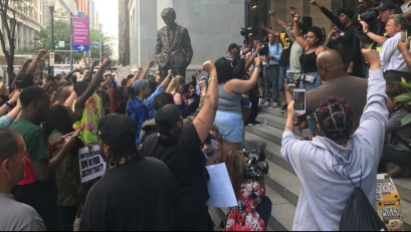Originally posted at the School Diversity Notebook. You can read part 1 here.
Last week, I wrote about recent research on racial disparities in school discipline. In a continuation of that post, I wanted to write about how themes from the research affect real students/families in very real ways as seen in a few recent stories.

It’s frankly hard to know how to set these up. As mentioned in part 1, these stories have been overshadowed by the stream of awful news that comes by the minute from the Trump Administration. But, they are extremely important. One story covers an extrajudicial student discipline system that I had never heard of. The other is a recent version of a story that we unfortunately hear all the time. Among several frightening characteristics and similarities, in both stories, Black and Latinx students are denied due process in ways that are deeply morally appalling.
Recently, the ACLU filed a lawsuit against the Riverside County Probation Department in California for it’s Youth Accountability Team (YAT). The YAT was ostensibly designed as program to intervene with so-called “pre-delinquent” or “delinquent” youth before they got into more serious trouble. However, it functions in the opposite way, basically“funneling [students] into the criminal justice system.”
Here’s what happened to one of the plaintiffs, Andrew:
- He was using an orange for a hacky-sack game with his friends at school and the orange bounced through the legs of a school resource officer. Andrew was handcuffed and taken to the principal’s office where they searched his backpack and found marijuana.
It already sounds extreme, but it gets so much worse. Here’s where the YAT comes in:
- Andrew was then given this option: sign a contract to be part of the YAT or go to juvenile court. Of course, no lawyer was present. He signed the contract.
- Andrew’s case is one of many. Specifically, YAT functions in 17 school districts in the county and “from 2005 to 2016, 12,971 youths were under a YAT contract, 25 percent of whom were accused of a noncriminal offense.”
- As you are likely expecting: “Black students were 2.5 times and Latinx students were 1.5 times more likely than white students” to be caught in the YAT dragnet. Students got into the YAT system for things like “talking back to teachers, earning poor grades, being late to class, or ‘pulling the race card.’”
- So, what happens? YAT contracts give law enforcement officials basically unrestricted access to student information, including school records, counseling reports and the contracts require regular drug tests and meetings with probation officers over and above what a court would likely recommend given the infraction. Probation officers could visit student homes, and one officer was even (and quite shockingly) quoted saying “We can do all kinds of surveillance, including wire taps on phones, without having to get permission from a judge.” That’s a real quote.
- Even worse: “law enforcement officials keep detailed information about YAT participants long after they’re done with the program, which can be used against them later.”
- The ACLU lawsuit (full text) is asking that the court prohibit the use of the YAT system under situations of coercion and without students fully understanding their legal rights. I’ll track any updates.

Then, there’s the story of Antwon Rose, a 17 year-old Black teenager who wasrecently shot and killed while running away, unarmed, from a police officer. There have been big protests (see photo above) about this in East Pittsburgh, but I’m not sure it’s gotten nearly enough attention in national news. The story itself is far too big to summarize in this post, but the links here have a lot of background.
I want to focus on the connection to Antwon’s experiences at school. This Huffington Post article reports that “a long shadow of police brutality followed Antwon Rose’s childhood.” Specifically, the very school that Antwon went to was already named in a lawsuit from 2017, charging that it fostered “a culture of abuse at the hands of high school administrators, security members and school resource officers.” Reflecting on Antwon’s killing, a protester (and graduate of that same school!) was quoted as saying:
- “When you think about where Antwon went to school…he saw his friends getting beat up by these cops and how the justice system works against their abusers. Would that not inform your interaction with police officers?” And,
- “In this present-day culture ― a culture where Antwon exists, where Tamir Rice exists ― to expect a black child to go into school and feel safe with officers who are armed … that’s violence against them.”
I don’t think I can end a write-up about Antwon Rose without including this poem that he wrote. His mother recently said that she wants everybody to hear it. The assignment was to write an “I am…” poem for his 10th grade English class, back in 2016. Antwon’s is titled “I am not what you think,” and it reads in part: “I dream of life getting easier / I try my best to make my dream true.” You can read the full poem at the link above.
As everyone knows, there is complete disregard/disdain for this issue at the federal level and things have been getting worse. ProPublica recently reported that more than 1,200 civil rights probes from the Obama administration have been shut down by Betsy DeVos. Many of these deal with school discipline issues. Ken Marcus was recently confirmed as the Assistant Secretary for Civil Rights under DeVos. As you can see in this letter from civil rights groups, things will not get better with his leadership.
So, what can be done? ProPublica is, in part, stepping into the void left by the DOE – you can use this “share your story”website to let them know about civil rights violations and your school. They may follow up with investigative journalism in place of actual investigation from law enforcement arms of the federal government.
And, I don’t think that the power of attention and communication can be ignored. Amidst the maelstrom of terrible news, it’s important to stay on top of the big stories that don’t get big coverage, to talk about these with friends, to get people fired up about it, so that we can make progress in the small places where that is possible and, hopefully, open up spaces for more progress in the future.


0 Comments